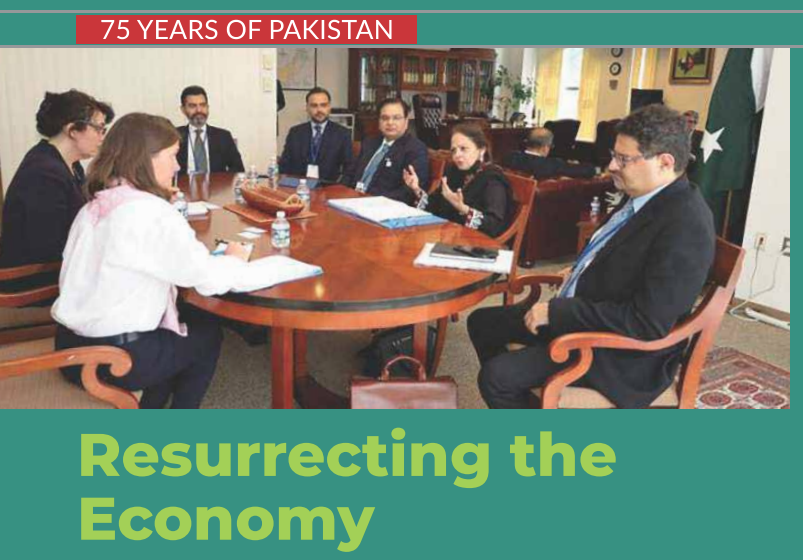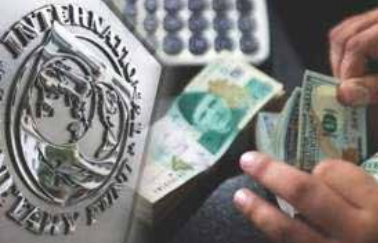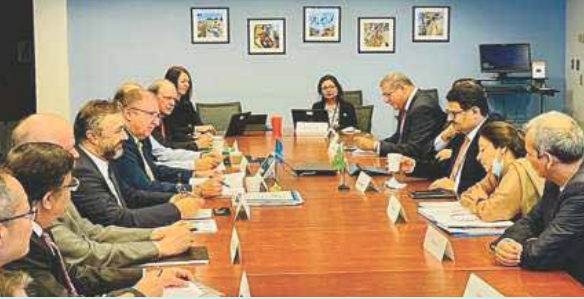
The Govt under Prime Minister Shahbaz Sharif’s stewardship has taken some unpopular and tough decisions to put the economy on the road to recovery, and one such feat is securing the IMF’s funding at a crunch time when the global economies indicators are dwindling.
By Kashif Rizwan
Although Pakistan has been receiving financial assistance from the International Monetary Fund (IMF) since 1958, yet the successive governments in Pakistan, particularly since 1988, have been striving to Pakistan’s economic sustainability. The economic performance of high Gross Domestic Product (GDP) rate between 5% to 6% in some years followed by 3% to 4% GDP rate for short periods.
There are several geopolitical, structural and economic factors that have hindered a consistent economic growth trajectory of the country. A long war against terrorism in neighboring Afghanistan, political and economic uncertainty at home, low govt revenues, low rate of savings, higher dependence on imported petroleum products/gas, imported raw materials/in-puts for industries, increasing imports of agricultural/foods products, negligible growth in exports and vulnerable foreign exchange reserves are the major factors that create a situation under which Pakistan has been resorting to the IMF for budgetary support. In the recent past, most of the times Pakistan faced twin deficits; fiscal as well as current account deficits due to higher expenditures than income/resources and negative balance of payments.
One of the functions of the IMF is to assist member countries facing financial difficulties to stabilize their monitory and financial systems. The measures/actions to be taken by Pakistan under the IMF programme are normally are aimed at helping our economy.
One of the functions of the IMF is to assist member countries facing financial difficulties to stabilize their monitory and financial systems. The measures/actions to be taken by Pakistan under the IMF programme are normally are aimed at helping our economy. Pakistan successfully implemented and completed its 21st IMF programme in 2017, and as a result, the GDP growth achieved in FY 2017-18 was 5.5% while the Federal Board of Revenue (FBR) receipts increased to Rs. 3,842 billion.

However, this GDP growth rate brought trade deficit of US$ 30.9 billion, negative balance of payments of US$ 42.7 billion and negative current account deficit of US$ 19.2 billion (6.1% of GDP). The foreign exchange reserves with State Bank of Pakistan (SBP) decreased from US$ 17.5 billion in Financial Year 2016-17 to US$ 11.3 billion in Financial Year 2017-18, due to which the rupee depreciated significantly under flexible exchange rate policy.
Mainly because of dwindling foreign exchange reserves with SBP and fast devaluing rupee against dollar and remaining indecisive for about nine months the previous PTI government signed a US$6 billion IMF Extended Fund Facility (EFF) on July 3, 2019. The program aims to support Pakistan’s policies to help the economic recovery from the COVID-19 pandemic, ensure macroeconomic and debt sustainability, and advance structural reforms to lay the foundations for strong, job-rich, and long-lasting growth that benefits all Pakistanis. The global lender has disbursed less than half of the amount till February 2022.
The IMF in its report released on August 29, 2022, states that the previous government of PM Imran Khan “Pakistan has a long history of stop-and-go economic policies and weak implementation of structural reforms. Since the IMF reviews in April 2021, the implementation of IMF programme has been uneven, rather fiscal policy became increasingly expansionary and several key EFF commitments were reversed. Moreover, several structural benchmarks (SBs) were not met.” The previous government shied away from fulfilling the commitments made with IMF, just to gain political milage, which led the country at the bring of default on its foreign payments. The government of PM Imran Khan provided unfunded subsidies to the oil and power sectors during his last days in office.
Soon after coming into power the Government under Prime Minister Shahbaz Sharif realized the gravity of the situation, approached the IMF to complete its seventh and eighth reviews under the EFF and restore the programme with increased funding facility. The government took tough decisions that were in the interest of the country, which have adverse political consequences for the ruling coalition.
The present government has taken decisive action to bring the EFF back on track, including implementing the IMF commitments through a supplementary budget, tighter monetary policy, withdrawing subsidies on electricity and gas tariffs. The war in Ukraine increased commodity prices in international market including significant increase in crude oil and LNG prices, which have placed significant pressure on the rupee and foreign exchange reserves.
The present government prepared the budget for FY 2022-23 inter-alia keeping in view the implementation of the IMF commitments of structural reforms and fiscal / monetary discipline and to have sustainable growth over the medium and long term. The present government has raised domestic fuel prices by more than 80 percent over the past month to meet the IMF conditions for the revival of the bailout package.

The politically unpopular move has drawn strong public criticism; however, the government has taken these decisions in national interest ignoring their political cost. The rising inflation caused by increased international commodity prices is a severe concern of the people at large and government is cognizant of this fact.
On the economic front it is the biggest achievement of this government to revive the IMF programme and restore the confidence of international community and investors on Pakistan’s economy. The IMF on August 31, 2022, released US$1.1 billion tranche, after long and arduous negotiations with the IMF staff. Pakistan has fulfilled all pre-conditions set by the IMF to restore the EFF programme.
The IMF program would hopefully address domestic and external imbalances and ensure fiscal discipline and debt sustainability, reforming the energy sector, allowing more exchange rate flexibility, enhancing the SOE governance, and generating higher and sustainable growth.
The Agreement with the IMF has set the stage to bring country out of economic turmoil. Prime Minister Shahbaz Sharif showed his resolve to reorient and re-structure Pakistan’s economy through hard work to achieve self-sufficiency. This would bring Pakistan to a long-term sustainable growth path, creating more jobs, encouraging both private and foreign investment leading to prosperity of its people.
The resumption of the IMF loan means Pakistan will have easier access to funds from other international lenders, including the World Bank and the Asian Development Bank. Pakistan needs at least US$41 billion in the current fiscal year to repay debt and fund imports. The revival of EEF programme with IMF will give positive vibes to other friendly countries like Saudi Arabia, UAE, China, who will come forward to provide financial assistance of up US$ 6-7 billion to Pakistan.
Timely and consistent implementation of policies and reforms is essential to lay the ground for stronger and more sustainable growth. The present government has taken important measures to strengthen fiscal policy and put public finances on a sounder footing. To improve fiscal resources the government has set a tax revenue target of Rs.7, 000 billion for FY 2022-23 up 16.66 per cent from Rs. 6,1125 billion.
By adopting careful spending management, revenue mobilization will help to create space for much-needed spending on infrastructure and social protection, while improving debt sustainability. Broader reforms in tax administration and public financial and debt management are expected to further improve the fiscal framework. The recent monetary policy tightening was necessary and continued proactive, data-driven monetary policy would help to anchor inflation.
In order to absorb external shocks, it is imperative to preserve market-determined exchange rate and rebuild foreign exchange reserves. Strong efforts to advance electricity sector reform are needed to restore the sector’s financial viability and address adverse spillovers on the budget, financial sector, and real economy.
Coming out of the default threat through restoration of IMF programme will increase SBP reserves, strengthen Pak rupee, boost stock exchange, and restore the confidence of industrial sector. It will help in bringing down inflation by following tight monetary policy and improving supply side. In case Pakistan remained committed to restructuring its economy and bringing reforms in its major economic sectors, it will get rid of begging bowl by turning around its economy.

The writer is the editor of “Economic Affairs”

